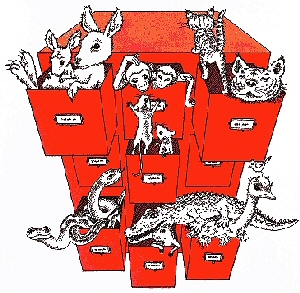Serendip is an independent site partnering with faculty at multiple colleges and universities around the world. Happy exploring!
Notes Towards Day 1 (Tues, Jan 17): On Learning to Classify


I. welcome!
...to an English class about genre,
an interdisciplinary class about "classification" and "categorization,"
some philosophizing about sorts and kinds.
Let's begin by doing some sorting (and getting acquainted...).
Begin w/ introductions:
write down 3 words (noun or adj.) that you use to “classify” yourself:
“classes” (=categories, groups) that are important to you,
and that you are comfortable using
Go round, say your name and 3 (other!) ways of "classifying" you.
As a group, let's go up one level of abstraction-->
what are the kinds of classes that we use to name ourselves?
Draw one (or more?) site maps on board:
categories with entries inside them
what classes did we use--and choose not to use?
conventional 6:
race (ethnicity)/class/gender/religion/sexual orientation/disability
are other categories more important than these?
why avoid some of these?
(too important? too scary? too obvious?)
what proportion of the categories are visible/invisible?
what proportion of the categories do we occupy willingly/unwillingly?
what proportion are "natural," imposed?
what categories matter most,
when we discuss our identities and those of others?
what do the categories signify?
In The Order of Things, Michel Foucault suggests that all such categories
of classification (and the way we put them in relation to one another) are
arbitrary, revisable .... look @ the first paragraph from his text: can we
draw a site map of these categories, as we did of our own classifications?
II. why'd we kick off class w/ this sorting exercise?
get you thinking/doing something experiential
--remind you that you know quite a bit already, from your life experience
--that what you know is infinitely revisable, in exchange w/ others
--that there's been lots of interesting work done in these areas,
where we can learn more....
“genre” is a category used to “classify” texts,
to signal to us "how to read" them, how to judge what they do
but that activity is part of a larger human gesture:
the starting point for this course is that we are “classifying” creatures
(given our neural networks/way we are wired,
we cannot but “classify,” turn high-density input into
low density classfications/categories/groups
(i.e.: seeing the forest instead of each tree)
BUT also that such classifications are "wobbly," "wiggly," fluid, porous--
and that we can revise those that are no longer useful to us.
This is a course about what classification gets us --
how we use it to manage the unclassifiable --
and about how it limits us --
how we are always pushing back/revising categories,
adjusting them to better reflect our emerging/changing sense of the world.
The great American pragmatist philosopher William James said, "the basis of every classification is the abstract essence embedded in the living fact,--the rest of the living fact being for the time ignored by the classifier. This means that none of our explanations are complete. They subsume things under heads wider or more familiar; but the last heads ... are mere abstract genera, data which we just find in things and write down" (The Will to Believe, rpt. The Writings of William James, 320)
This is a course that invites you to think about the usefulness of genera, in general,
by focusing, in particular, on the literary classifications we call "genres."
According to the Oxford English Dictionary,
fr. OF. gen(d)re (F. genre) =
Sp. and Pg. genero, It. genere,
ad. L. gener- stem form of genus race, kind
GENS
A clan or sect; a number of families united by the ties of a supposed common origin, a common name, and common religious rites. Hence employed to designate any similar aggregation of families.
1a. Kind, sort, class; the general gender: the common sort (of people). Obs.
LADY MORGAN Flor. Macarthy (1818) IV. iii. 144
But what is the genre of character...which, if in true keeping
to life and manners, should not be found to resemble any body?
T. MOORE (1856) VII. 273
Two very remarkable men...but of entirely different genres.
b. spec. A particular style or category of works of art; esp. a type
of literary work characterized by a particular form, style, or purpose.
I chose to start this class by asking you to identify the "sort of genre" you represent.
I could have started differently, more "literarily," by reviewing the conventional European generic divisions, describing the logic of their differences, how much they depend on silent reading, or on local divisions between prose and verse:
- lyric/drama/epic (narrative)--> speaking for oneself, as another, about another
- poem/play/story/essay (fictional/non-fictional prose)
- romance/realism/naturalism
- romance/comedy/tragedy/satire (irony)
We could have each listed the genres we know and like, and talked about the grounds of their distinctions
(we will do that later in the semester, when we select the second 1/2 of our readings together...).
But I started instead w/ the "genre of our characters" to make the point that the sort of classifying that is genre-making is not just literary, but a much larger human project, with aesthetic, cultural and political resonances. As William James also said, "Individuality outruns all classification, yet we insist on classifying every one we meet under some general head ... the life of philosophy largely consists of resentments at the classing, and complaints of being misunderstood" (The Pluralistic Universe, rpt. WWJ, 483). We'll be exploring some of those resentments, as time goes on....
But! our first test case will be about the ways in which the
"class"/category/genre of academic writing is shifting now;
the second will be graphic narratives; the third (and fourth?) we'll decide on together....
Our syllabus is on-line @
/exchange/courses/literarykinds/s12
you should bookmark this, and check it in preparation for every class;
it will change as the semester goes on, so be sure to "re-fresh" each time you go back
I'm going to take you now to a # of other webpages that you'll be using for the course;
all of them are available from this homepage.
For instance: you’ll have reading to do for each class;
for the first month, you'll find it all available, via active on-line links from the syllabus;
by early February, you should also buy/rent/check out/share three graphic narratives:
Scott McCloud's Understanding Comics, Neil Gaiman's A Game of You,
and Marjean Satrapi's Persepolis (1&2).
I am asking you to read and to write regularly, both in and out of class,
and to meet with me @ least twice (before the first and last writing
projects are due) to discuss your thinking and your writing.
What's unique about this course is that -- besides talking w/ each other in person,
and handing in one piece of more formal writing each month ,
and having conferences about your writing --we will be meeting virtually,
over each weekend, in an inbetween space: our on-line/class forum @
/exchange/courses/literarykinds/s12/conversation
By each Sunday evening, I am asking you to post a comment in that space,
reflecting on our discussion from the week before, anticipating what's upcoming
(more deliberate than speaking in class, less formal than written work:
excellent place for showcasing revisionary thinking).
Learning to be a public intellectual, thinking out loud:
it's on the internet, not a closed space, so readable-by-the-world,
and discussable in class (starting point for most class meetings....).
To do the postings, you need to follow these instructions-->
register now (before Thursday's class), so you'll have your password,
and be set to go on Sunday evening, when your first posting is due.
This informal writing is background/preparation/warm-up/frequent source
for your more “formal” writing assignments, which will also
take the form of four "web events," due once/month
(three 4-pp. projects, one 12-pp).
That's the basic pattern for our thinking-and-writing:
for each class, we'll have some new material to read and discuss together.
By 5 p.m. each Sunday evening, post a short comment
in our on-line course forum, reflecting back on/for forwards toward our discussion.
What is (probably) also distinct about this course is the form of evaluation:
I will not grade any of your individual papers. @ the end of the semester,
you will complete a portfolio of all your work, and evaluate yourself.
The checklist of my expectations, are all on-line
(this is not mysterious: be present in class and conferences,
contribute in-person and on-line, post your web events on time,
be responsive to instruction, engaged in the conversation...).
N.B.: my belief in education as a collective endeavor,
our shared responsibility for each other's learning....
Talking about "accomodations" (cf. syllabus statement from Access Services):
we will all of us need a little space, a little "slack," in the course of the semester;
to "accomodate this," our shared responsibility involves letting one another know,
making alternative arrangements (for ex, if you need to miss class, read the
course notes, do another posting "saying" what you might have said,
had you been here...)
What else?
Questions about any of these details of "course-keeping"?
reminder that links to all these pages--on-line course forum,
syllabus, instructions for posting, a growing file of my "talking notes"
for class--are available as links from our course home page @
/exchange/courses/literarykinds/s12
For Thursday: read on-line:
Jonathan Lethem's piece on "The ecstasy of influence: a plagiarism,"
from Harper's Magazine (the oldest general interest monthly in America)
Ed Folsom, Database as Genre: The Epic Transformation of Archives and
Peter Stallybrass, Against Thinking. PMLA Special Topic: Remapping Genre.
122, 5 (October 2007): 1571-1588 (the archetypal/ prototypical journal
of the profession of literary studies) --so: two different "genres" of writing
Also! bring to class two copies of a recent sample of your own writing
(and, if possible, the instructions/prompt that provoked it):
along w/ some of your own thoughts about what genre it is:
what are its defining characteristics?
in Lethem, Folsom and/or Stallybass's terms, how does it "think"?


